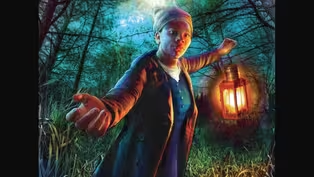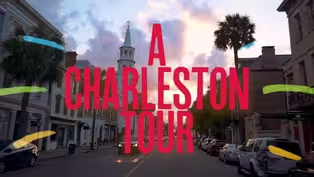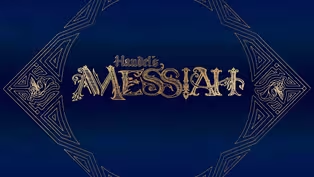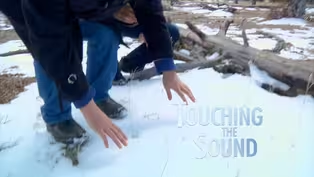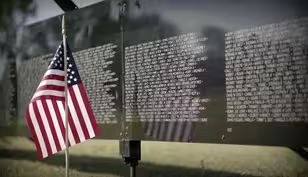
Remembering Willie Earle
Special | 17m 13sVideo has Closed Captions
On February 17, 1947, 24-year-old Willie Earle was brutally killed in South Carolina.
On February 17, 1947, 24-year-old Willie Earle was brutally killed in Greenville, South Carolina. Earle is the last known victim of racially motivated lynching in South Carolina. His death and the acquittal of his accused killers made international news in 1947.
Problems playing video? | Closed Captioning Feedback
Problems playing video? | Closed Captioning Feedback
SCETV Specials is a local public television program presented by SCETV
Support for this program is provided by The ETV Endowment of South Carolina.

Remembering Willie Earle
Special | 17m 13sVideo has Closed Captions
On February 17, 1947, 24-year-old Willie Earle was brutally killed in Greenville, South Carolina. Earle is the last known victim of racially motivated lynching in South Carolina. His death and the acquittal of his accused killers made international news in 1947.
Problems playing video? | Closed Captioning Feedback
How to Watch SCETV Specials
SCETV Specials is available to stream on pbs.org and the free PBS App, available on iPhone, Apple TV, Android TV, Android smartphones, Amazon Fire TV, Amazon Fire Tablet, Roku, Samsung Smart TV, and Vizio.
More from This Collection
Find independent producers who have submitted programs to South Carolina ETV.
Breakfast in Beaufort: Journeys Through Time
Video has Closed Captions
A group of wise men, ranging in age from 84 to 101, gather weekly for coffee and breakfast. (26m 45s)
Harriet Tubman | From the Railroad to A Spy
Video has Closed Captions
Journey through the events and details of her incredible life story that are seldom told. (56m 46s)
Selections from Handel’s Messiah
Video has Closed Captions
Handel's Messiah performed by the Bob Jones University symphony and choirs. (58m 4s)
Video has Closed Captions
TOUCHING THE SOUND traces the artistic development of young pianist Nobuyuki Tsujii. (56m 46s)
Providing Support for PBS.org
Learn Moreabout PBS online sponsorship- [Interviewer] Did your parents ever warn you when you were growing up to behave well, so you wouldn't get lynched?
- Oh yeah, oh yeah, yeah.
Yes, they warned us.
They warned us.
"Be careful, don't mess around 'cause they'll lynch, they'll kill you," and they would.
♪ Well it was in my childhood days ♪ ♪ Oh Lord, many years ♪ ♪ Many long years ago ♪ ♪ Now with the spirit of my savior ♪ My name is Acquillious Jackson.
Initials, they gave me initials, AQ Jackson.
I was born 1929, May the 1st, 1929.
I have pretty fair health.
I never had a toothache, and I've lived a pretty good life.
I can just close my eyes and see Willie and his brothers and sisters.
They had a pass, going right down through there, crossed the little ranch right up to the house.
I can see them now coming up through there, coming to see us every morning, every evening, stay and play until it got late and sometimes we'd fall asleep, and we would just stay there till the next morning.
I believe that if Willie was living today, and knowing him from back then at that time of age, I think Willie would be something like a preacher.
He'd be a saint man.
He'd be an upright man, knowing what Willie was then.
He was a good guy.
That's why it hurt me so bad.
when I found out that they had murdered Willie Earle.
(enchanting music) - [Announcer] The United States of America, land of freedom, down where the blue Atlantic rolls against warm white sands and palm-fringed shores, lies the State of South Carolina.
Second to none in wealth of interest and warmth of hospitality - Well, South Carolina in a way is kind of the heart of darkness, in African American discourse they sort of in a sense rank Southern states, and the worst places are Mississippi and South Carolina.
Alabama has an honorable mention as well.
- [Announcer] When you mention the south most people think of cotton.
In South Carolina, the great cotton days began in the early 1800s.
Cotton picking scenes like this were as familiar then as they are now.
- The communities were segregated.
We were the last ones waited on in department stores, we could not try on any shoes, we could not try on any clothes.
But I came along with the generations that began to ask why.
- [Announcer] All these will be yours to enjoy when you come... ♪ To south, to Carolina ♪ - I didn't see Willie in, you know, several weeks, only thing I know that Willie worked in Greenville during the week.
Then he'd go home on a Saturday to his mother's, which lived in Liberty.
And Willie would go on the bus sometime they say, but I don't know why they said he went in the cab driver that Saturday night - [Bryant] Cabs were sites of some conflict in this part of South Carolina, and the cab drivers themselves were feeling a little pressed.
I think more people had flooded into that business so they weren't making as much money when they got home as they thought they would.
Cabs worked differently in every Southern city.
In some places, there are African American cab companies that take African Americans where they wanna go.
And there's whites who take whites where they wanna go.
South Carolina, or this part of South Carolina, is interesting, the cab drivers are all white and blacks ride in white cabs.
And so it becomes this interesting place where a black person can tell a white person what to do.
- [Narrator] Thomas Watson brown drove a Greenville cab.
He was a 48 year old World War I veteran and a former textile worker.
People said that the war had frayed his nerves and that he couldn't stand the relentless clatter of the giant looms.
So he left the mills and started driving a cab.
On February 15th, 1947, Thomas Brown picked up a fair in Greenville and drove toward Liberty 20 miles west.
He never got there.
Just outside of Liberty someone, surely a customer, stabbed him and left him bleeding on the ground.
The police pointed a quick finger at Willie Earle, claiming that it was Earle who took that cab from Greenville where he lived toward Liberty, where his mother Tessie lived That, on the way, Earle robbed and stabbed Thomas Brown.
That shoe prints with new heels led a mile or two from the crime scene, right to Tessie's door.
That his search of Tessie's house, turned up Willie's bloodstain jacket and new healed shoes.
And that when he was arrested the next day Willie Earle was carrying a big scout knife, with traces of blood.
- They claimed that he had stabbed a cab driver, a yellow cab driver from Greenville, they claim.
But I heard different stories that Willie didn't go to Liberty in no cab that Saturday night.
- [Narrator] Tessie Earle and others told different stories.
Willie did travel from Greenville that night, they said, but he came by bus not cab.
Willie's clothes had no blood on them, they said.
A dying Thomas Brown told police that his assailant was a large negro.
Willie Earl was 5'9" and weighed 150 pounds.
Rumors even swirled in the black community that a white cabbie, a romantic rival, had stabbed Brown.
Courts of law exist to resolve exactly these sorts of differences, but Willie Earle's case never made it that far.
- It was on a Monday morning.
I had done bought me a old 35 Chevrolet, I believe it was 35, 1935.
And I was in my backyard that morning at about nine or 10 o'clock.
And I was listening to the radio and I heard the man on the news stated that Willie Earle was taken from the Pickens County Jail.
- [Radio Announcer] Willie was then taken into custody and placed in the Pickens County Jail on Saturday night.
- [George] I George Roger McFalls, make the following statement to Frank Reed, Deputy Sheriff of Greenville County, South Carolina; About three or four o'clock in the morning, of February 17th, 1947, I came in off a drive in the yellow cab which I drive for the Yellow Cab Company of Greenville, South Carolina.
There was a bunch of cab drivers at the yellow cab office.
They asked me if I was with them to go to Pickens South Carolina, to get the Negro who cut Mr. Brown, a yellow cab driver.
I told them I was with them.
We all loaded in taxi cabs and started towards Pickens.
(car engines starting) I got in the car with Paul Griggs, who was driving a 1941, Mercury - [Paul] I Paul F Griggs Jr, make the following statement of my own free will and the accord with knowledge that it may be used in any court of law against me.
I am making this statement to Lieutenant Virgil L. Ashmore, South Carolina, Constable.
I followed the procession to the Pickens Jail.
All along the way I never had a clear conception of what would take place at the jail.
I think that some of us had a vague idea that the Negro would be taken out of the jail and done away with, but I know that my I myself never thought that I personally would do this.
- [Radio Announcer] On early Monday morning, an angry mob of fellow cab drivers broke into Willie's cell and drove him down- - [Paul] I was in the rear against the wall and couldn't see exactly what took place up front.
But I heard someone tell the jailer that we wanted the Negro that knifed Mr. Brown.
The jailer asked someone if they were sure they knew what they were doing.
- [Chas] At this time, Hurd was carrying a shotgun.
When we got upstairs, Hurd and Red Fleming went into the cell and got the nigger.
Fleming and Hurd, or Griggs and Hurd, brought the downstairs and Hurd carried the shotgun.
They went out the side door, I went out the front.
- [George] I stayed in the yard, but a bunch of the men went into the jail and brought the Negro out.
I don't know which one of the cars the Negro was placed in, but I know he was put into one of the cars.
- [Chas] The nigger was placed in the back of Clerdy's cab, which is yellow cab number five.
We were the lead car away from the jail, and the other cars followed - [Radio Announcer] Drove him down Bramlett Road, crossing county lines in to Greenville, South Carolina.
- [Paul] We traveled the Old Easley Bridge Road until we reached the Bramlett Road where we could see the cars in front and strung out.
We drove to the old slaughter pens of the Southern Provision Company where all cars stopped.
- [Chas] Other drivers gathered around, and Stokes questioned the nigger for about five minutes about why he stabbed Mr. Brown, the nigger denied it.
Then Stokes pulled out his pocket knife, which he opened, and said, "Before you kill him, I wanna put the same scars on him that he put on Brown" - [Marvin] Prior to the shot, I heard Clerdy say, "Don't beat that nigger with that gun and get blood on it."
- [Paul] The other drivers, after parking came up and all tried to get the nigger to confess.
Then Red Fleming got in the front seat and talked nice to the nigger.
Red told him, he didn't have long to live and he didn't wanna die with a lie on his heart.
The nigger then confessed, and said he stabbed Mr. Brown.
- [George] ... showed me photographs of various taxi drivers by the officers?
And can I definitely identify- - [Chas] Rector then pulled the Negro out of the car by his belt, and took him behind the car.
Rector and Griggs hit him several times with their fists and knocked him to the ground.
- [Paul] I could hear some licks, like they were pounding on him with the butt end of a gun.
I heard the Negro say, "Lord, you done killed me."
- [Chas] Hurd said, "Gimme the gun, let's get it over with."
- [Roger] I do not know who fired the shots.
- [Paul] And as the nigger was on the ground leaning on his elbows.
- [Roger] I put my hands over my ears.
- [Chas] Hurd shot him.
(gun fires) (pensive music) - Just like I said, I was doing something to my car the next morning, and the news come on the radio that they had murdered Willie Earle.
And I told my mother that I'ma drive over there just to see, I want to see that spot where Willie was murdered.
Top of this hill right here, right here.
This is it.
This is it right here.
Right here, right here.
Go to the left, this is it.
I noticed where the cab drivers had just drove all up on the side in this area right over there, and that's where they killed him at, that's the area right there.
And when I got there, there was nobody there, they had done moved the body.
And I just happened to look in some little bushes where I was standing at and I could see blood and brains in the bushes.
And I said to myself, that must to be his brain.
When they shot him with that shotgun that came outta Willie Earle's head, they blew his head off.
And I just sat here in my car and just looked and cried to myself.
It was a sad, sad, sad moment.
(pensive music) ♪ In that little ♪ ♪ Oh that wooden church house ♪ ♪ Out on a hill ♪ And it moved from there to the trial, and that was the terrible-est trial you ever want to hear in your life.
♪ If you people will listen to me ♪ ♪ From my heart I play ♪ - During the trial we had national news people, the New Yorker and different ones here, reporting on the Willie Earle case.
♪ For I'm American ♪ ♪ Praise the Lord ♪ ♪ I'm American ♪ ♪ Praise the Lord ♪ ♪ I'm American ♪ - [Narrator] Spectators streamed into the Greenville County Courthouse.
Whites, through the front door, blacks through the side and up to the Jim Crow balcony.
They all came to see something new, few lynchers had ever been prosecuted.
Now, dozens of Willie Earle's killers would stand trial.
26 had signed confessions, conviction seemed possible.
♪ When you work and play and sing ♪ ♪ You'll be proud of your liberty ♪ ♪ For we are American ♪ ♪ Praise the Lord ♪ ♪ We are American ♪ ♪ Praise the Lord ♪ ♪ We are American ♪ ♪ Praise the Lord ♪ An all white jury acquitted everyone on all counts.
♪ Come on boys and let's do our dance ♪ - I just wished you could have been there and hear that trial.
I just don't believe that...
I just don't see how, really, a man with common sense, and being a human being could listen to some of them stories they told at that trial.
But then I thought about Jesus, I said, they murdered him the same way.
♪ For we are American ♪ ♪ Praise the Lord ♪ ♪ We are American ♪ ♪ Praise the Lord ♪ ♪ We are American ♪ ♪ Praise the Lord ♪ ♪ Praise his holy name ♪ If I had the chance to say goodbye to Willie, the last words I would tell Willie, I would tell Willie, you was good.
You fought a good fight, and it was wrong with them doing you like that.
Hold your head up high, and go on to a better place.
You're at a better place.
♪ In that little ♪ ♪ Oh, that wooden church house ♪ ♪ Out on the hill ♪ ♪ For I'm American ♪ ♪ Praise the Lord ♪ ♪ I'm American ♪ ♪ Praise the Lord ♪ ♪ I'm American ♪ ♪ Praise the Lord ♪ ♪ Praise his holy name ♪ ♪ When you walk down the street ♪ ♪ Smile at everyone you meet ♪ ♪ Rich or poor, young or old ♪ ♪ Let this message to you be told ♪ ♪ When you work and play and sing ♪ ♪ You'll be proud of your Liberty ♪ ♪ For we are Americans ♪ ♪ Praise the Lord ♪ ♪ We are Americans ♪ ♪ Praise the Lord ♪ ♪ We are Americans ♪
Support for PBS provided by:
SCETV Specials is a local public television program presented by SCETV
Support for this program is provided by The ETV Endowment of South Carolina.

